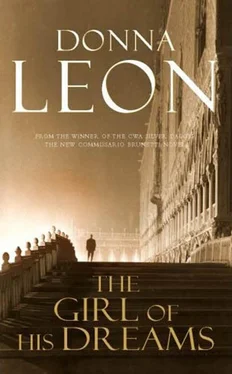Having staked his claim once again, he went back and shut the front door. From the terrace, he heard scraping sounds. Here in the living room, the sun had been coming in for much of the morning.
His place, the sun shining on to the back of the chair, was at the head of the table. He walked towards it, patting Chiara's shoulder as he passed her. Chiara wore a light sweater, Raffi only a cotton shirt, though Paola wore both a sweater and a down vest he thought belonged to Raffi. How was it that parents as cold-blooded as he and Paola had produced these two tropical creatures?
He was instantly glad of the warmth on his back. Paola reached for Chiara's plate and, from a large bowl in the centre of the table, spooned up fusilli with black olives and mozzarella: it was a bit early in the season for a dish like this, but Brunetti rejoiced in the sight and scent of it. After setting the plate in front of Chiara, she passed her a small dish of whole basil leaves: Chiara took a few and ripped them into small pieces to sprinkle over the top of the pasta.
Paola then served Raffi and Brunetti, both of whom added torn basil leaves to their pasta, and then she served herself. Before she sat down, she set the spoon aside and covered the bowl of pasta with a plate.
'Buon appetito’ Paola said and began to eat. Brunetti took a few bites, letting his whole body remember the taste. The last time they had eaten this dish had been towards the end of the summer, when he had opened one of the last bottles of the Masi rosato to go with it. Was it too early in the year for rosato? he wondered. Then he saw the bottle on the table and recognized the colour and the label.
'There are calamari ripieni after’ Paola declared, no doubt hoping to make it easier for them to decide who wanted to finish the pasta. Chiara, who had the day before added fish and seafood to the list of things she, as a vegetarian, would not eat, opted for more pasta, as did Raffi, who would no doubt go on to pack away his sister's portion of calamari with undiiriinished appetite and a clear conscience. Brunetti poured himself a glass of wine and assumed the expression of a man who would never think of taking the food from the mouths of his own hungry children.
Chiara helped carry the plates back to the kitchen and returned with a dish of carrots and peas, while Paola brought out a platter of calamari, and he thought he could smell the carrots and leeks – perhaps even chopped shrimp – with which they were filled. Conversation was general: school, school, and school, leaving Brunetti to say he had seen the Contessa that morning and brought her love to all of them. Paola turned her head and gave him a long look when he said this, though the children found it in no way strange.
Seeing Chiara reach for the platter, Paola distracted Raffi by asking him if he and Sara Paganuzzi were still planning to go to the cinema that evening and, if so, would he like to eat something before they went? He explained that the film had been supplanted by a Greek translation Sara had still to finish, and so he would be going to her home that evening, both for dinner and to help her with the translation.
Paola asked him what the text was, and that led to a discussion of the rashness and folly of the Peloponnesian War, which both found sufficiently interesting to distract them from the sight of Brunetti and Chiara finishing the calamari. Nor did they notice Brunetti lift his empty plate and use it to cover his daughter's.
Athens defeated and the walls destroyed, Raffi finished the vegetables and asked about dessert.
But by then the sun had disappeared, not only from Brunetti's back but from the sky, which was suddenly covered by clouds slipping in from the east. Paola got to her feet and gathered up the plates, saying there was only fruit for dessert, and they could eat it inside. Relieved, Brunetti pushed back his chair, picked up the empty vegetable bowl and the bottle of wine, and went back towards the kitchen.
Long exposure to the vagaries of springtime had chilled him sufficiently to render the thought of fruit unattractive. Paola told him she'd make coffee while doing the dishes and sent him into the living room to read the paper.
She found him there about twenty minutes later. The unopened newspaper lay on his lap, and Brunetti stared off at the rooftops and the sky. That day's headline, giving further details about the recent capture of one of the chief leaders of the Mafia, looked up at the room, shouting for attention.
She stopped behind the sofa, two cups of coffee in her hands, and asked, 'Reading about your triumph?'
Brunetti closed his eyes. 'Indeed,' he answered. 'A triumph.'
'It's enough to make a person give serious thought to emigration, isn't it?' she asked.
'He's been on the run for forty-three years, and they find him two kilometres from his home.' He raised a hand and let it fall with a helpless slap on the open newspaper. 'Forty-three years, and the politicians fall over themselves praising the police. A triumph.'
'Perhaps what they really mean is that it's a triumph for the power of the Mafia,' Paola suggested. 'It would all be so much easier if the government simply gave them the right to appoint their own minister.' There followed a reflective pause, after which she asked, 'But what to call him? Minister of Alternative Power? Minister of Extortion?'
She placed the coffee on the table and sat beside him.
Knowing he should not say it, Brunetti asked, 'What makes you think they don't?'
'Don't what?'
'Have their own minister.'
Her glance was sudden, alarmed, as she registered that she had just heard something he was not meant to have said.
Her silence grew eloquent until he was forced to speak into it. 'There are voices,' he said and leaned forward to take his coffee.
'Voices?'
Brunetti nodded and sipped at his coffee, keeping his eyes turned away from her.
Paola read this correctly, as a sign that the subject needed to be changed, and so she asked, 'What did my mother have to tell you?'
'That priest friend of Sergio's – the one who came to the funeral: Antonin Scallon – he asked me to find out about someone.'
'You working for Opus Dei now, Guido?' she asked with feigned horror.
It took a few minutes for him to explain Antonin's visit and its purpose, and as he spoke he realized how uncomfortable he felt in recounting the story. Something about it did not harmonize either with his memories of Antonin or with his own dramatic instincts: he could not believe in the motives Antonin attributed to anyone in his story nor, for that matter, in the priest's declared motives for coming to see him.
'Do you think there's something going on between Antonin and the man's mother?' Paola asked when he had repeated everything the priest had told him.
'Trust you to go right for his throat,' he said, not without admiration.
‘I don't think it's his throat that's involved here,' Paola observed, taking up her cup of coffee.
Brunetti grinned and considered this, wishing that he had a grappa, or perhaps a cognac, to replace the missing fruit. Then he said, 'I'd thought of that. Certainly it's a possibility. After all, the poor devil spent two decades in Africa.'
Her answer was immediate. 'Does that mean he's bound to have been turned into a sex-crazed maniac by the propensity of the lower races toward sexual excess?'
He laughed, amused at her tendency always to assume that he thought the worst of human nature. Though Paola could now only with difficulty bring herself to vote for the politicians who represented the Left, Brunetti was pleased that her instinct to defend the underdog was still intact. 'Quite the opposite, in fact. My guess is that he saw himself as so superior to Africans that he'd have no real contact with them, and that when he got back here, he'd go after the first European woman who looked at him.'
Читать дальше





![Theresa Cheung - The Dream Dictionary from A to Z [Revised edition] - The Ultimate A–Z to Interpret the Secrets of Your Dreams](/books/692092/theresa-cheung-the-dream-dictionary-from-a-to-z-r-thumb.webp)






